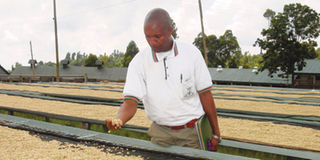Board eyes coffee branding to increase earnings

PHOTO | MUCHIRI GITONGA Nyeri coffee advisory officer Charles Nyamweya inspects coffee beans at Gichathaini coffee factory in Mathira, Nyeri.
What you need to know:
- Regulator steps up efforts to give the cash crop unique appearance that could see it sold as a distinct product in the global market
Increased branding efforts by a regulator could see Kenyan coffee start trading globally this year as a distinct product.
The Coffee Board of Kenya said this would give the product a competitive edge in the international market. Despite its reputed distinctive taste, the country’s coffee has no identity at the global level as it is normally used to blend lower quality tastes from other countries.
In a bid to reclaim the identity of the local bean, the board launched a mark of origin and a brand logo three years ago and has since registered it both locally and internationally.
Customer satisfaction
The board is said to be ready to roll out and commercialise the mark of origin and enforce the rules governing its application. This means that licensed users of the mark will have to be registered by the board.
This is expected to improve trade in Kenyan coffee and attract new customers. The regulator said it would also provide a measure for customer satisfaction.
It also developed, and shared with stakeholders, rules of application of the mark of origin before registering them with the Kenya Industrial Property Institute (KIPI).
Although the board has applied for international registration of the rules by the World Intellectual Property Organisation (WIPO), some countries have approved them while others have raised objections.
“Our lawyers are pursuing the objections in areas where Kenya stands to gain while those of no value to us have been put on hold,” Mr Benson Apuoyo, the marketing and research manager at the board, told a coffee stakeholders forum at a Karatina hotel last week.
Farmers from Kirinyaga and Nyeri counties were attending a workshop to sensitise them on the code of practice and standards developed by the board and industry stakeholders.
Mr Apuoyo said coffee branding is a means of building and sustaining trust among buyers which would translate into more income for the farmers. “The board is testing the applicability of the rules of mark of origin with a few selected coffee dealers who are loyal to Kenyan coffee,” he said.
Coffee supports about five million Kenyans. The sub-sector had been in decline for about two decades due to a myriad factors such as poor governance in the cooperative sector, poor prices, climate change, and high production costs.
A raft of reforms initiated by the government, among them the development of the coffee standards and a code of practice, has put the industry on a recovery path.
Kenya has not had any documented coffee standards or code of practice for various players in the coffee industry. However, some private farms and cooperative societies have been getting certification from standard organisations like CAFÉ, Utz, Rain Forest Alliance, and Fair Trade.
Mr Samuel Omolo from the Kenya Bureau of Standards, which was instrumental in the development of the technical and regulatory standards and code of practice, said the standards are not different from those provided by the international certification bodies.
“The science of developing these standards is the same across the world. Since we now have our own, these certification bodies must prove that what they are bringing is different from what we have,” said Mr Omolo. He said industry stakeholders found the need to develop preliminary standards to bring order to the sub-sector so that Kenyan coffee can be distinguished from others in the world market through its quality.
Code of practice
“There are many coffee producers in the world and each claims theirs is the best. What is important is to ensure we have what the consumers want for dollars to start flowing into the country,” said Mr Omolo.
The code of practice is aimed at creating a common understanding on how things are to be done for the safety of the consumer. Farmers are the most critical players in the implementation of the code.




